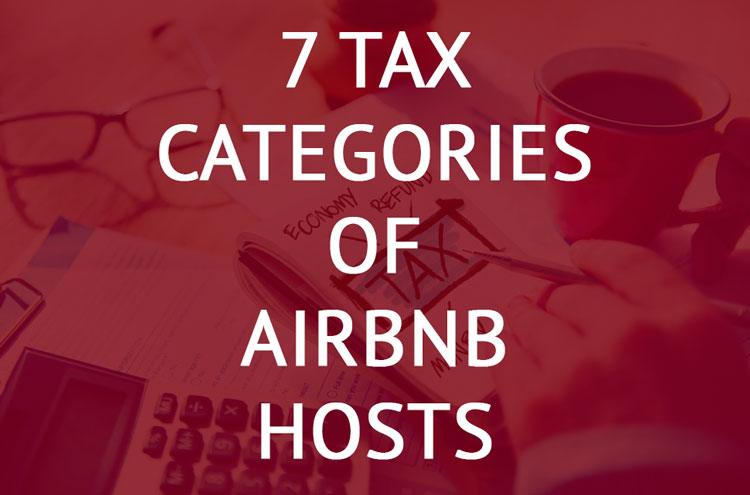
Airbnb hosting is a fun way to meet new people and make extra cash. Some hosts are in it for the companionship and a little side money while others have full-time operations with one or more units making five to six figures. What makes Airbnb fun is the openness of the host community to share best practices and replicate business plans.
In the tax code, however, every host has their own unique fact pattern and tax profile which means you could be on the hook for taxes while your peers steer free and clear. While the federal tax code is 74,608 pages long, we’ve made a brave attempt to condense the tax rules and compartmentalize them into 7 categories.
Category #1 – Radicals
The radicals are a group of Airbnb renters who are thriving in the the sharing economy. If you are radical, you’ve realized that sharing your apartment is a great asset to make extra money. There are three ways radicals share their space, and all three are taxed differently. You will be taxed either as a Space Sharer, a Reliable Roommate or a Weekend Warrior.
- If you’re a Space Sharer, you will Airbnb out any available space you can share – couch, bed, etc – to get some extra income.
- If you’re a Reliable Roommate, you will Airbnb out a private room and exclusively use it for renting.
- If you’re a Weekend Warrior, you will Airbnb out your entire apartment when away on vacation, holidays, travel, or business trips.
Click here to learn more about Airbnb Taxes for Radical Renters.
Category #2 – Homeys
The Homeys are the group of homeowners who are passionate about meeting new people and sharing extra spaces no longer being used. They are the Empty Nesters and Backyard Builders.
- If you’re an Empty Nester, you airbnb out the extra rooms in your house throughout the year.
- If you’re a Backyard Builder, you take the extra space in your backyard, build a small cabin, and airbnb it for the entire year.
Category #3 – Guerillas
The guerrilla Airbnb hosts are the creatives of the sharing economy. Their true identities and motivations are yet to be discovered. If you are a guerrilla host, you will Airbnb out your van, trailer, cave, boat, tent and any other unique but livable places you can imagine. While extra cash is great, you also like a little bit of fame that comes with being a guerilla. Just as guerillas’ hosting spaces are unique so too are their taxation.
Category #4 – Traditional Bed & Breakfast Hosts
The Host that started it all. Offering a place to stay and serving a hot meal rocked the hospitality industry. They register legitimate businesses, invest in a multi-room property, and manage the day-to-day operation of the bed & breakfast business. Many hosts paved the road to the taxing of b&b’s through various tax court cases over the years.
Category #5 – Rentrepreneurs
The Rentrepreneurs are the professionals who are focused on taking their Airbnb operations to the next level.
- If you are a Solo Hustlers you have realized that Airbnb hosting is an art and your true calling. You have put in sweat and blood to learn tricks of the trade – optimizing pricing, dominating listings, managing reviews. You are willing to make sacrifices to take it to the next level – whether it is crashing at their friend’s place or staying at a cheap motel while the guests are staying at your place…the hustle is real. Solopreneurs are business owners and file as a sole proprietor.
- To take it to the next level, Rentrepreneurs find a group of friends and business partners who will pool their money together, rent multiple Airbnb units at carefully selected locations, then hire property managers and Airbnb consultants to make six figures in a short amount of time. Taxation for these type of rentrepreneurs are either partnerships or small corporations.
Category #6 – Traditional Vacation Home Owners
The vacation home owners are taxpayers who can afford to own multiple properties for investment purposes. They purchase a property in a vacation spot they love and rent out their home throughout the year when it’s not being used. They hire a property manager to manage the place, and they cash in on rental income. In a traditional sense, many tax laws are also modeled after the court cases involving vacation home owners and their savvy accountants.
Category #7 – Traditional Real Estate Investor
The investors are taxpayers who sets up partnerships and corporations to own multi-units apartments, rental units, and commercial buildings. Their customers have a contract of at least a one year lease. They are business savvy, they hire CPA firms, consulting firms, property managers, and they collect passive rental income. Historically, investors found a loophole to take massive losses buying up properties to offset their ordinary income. The IRS caught on, closed the loophole, and now heavily enforces clear distinctions between passive and active losses.
Stay tuned as we deeply explore each categories which will save you a lot of time and definitely a lot of money. For each categories, we’ll determine which are active versus passive, business versus rental, what are available deductible expenses, and how to properly allocate your business expenses.
VOTE NOW
Which category do you see yourself operating in?
Vote now and we’ll feature your category first.
[yop_poll id=”2″]
Didn’t find the category that fits with your tax profile? Contact us here and we’ll help you figure it out.



